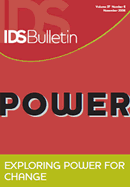Exploring Power for Change

Concepts and methods of participation' are used increasingly to shape policy and deliver services. Such approaches throw new light on complex interactions within and between society and state institutions at all levels. They lead to questions about how different kinds of knowledge and values shape policy choices.
- What are the societal and political processes through which power operates that inform whose voice is heard and whose is excluded?
- What is power?
- Is it about making people act against their best interests; or is it the glue that keeps society together?
- What are the connections between power and social change?
These questions are at the core of research and teaching at IDS, and this IDS Bulletin presents current work on the practice of power in development and the entry points for change.
Contributions to this issue, and ways in which power is interrogated, are very varied - despite a shared commitment to exploring its meaning for social change. In categorising power in the way the team has, the intention has not been to offer a comprehensive or exclusive framework for analysis. Rather, a positive spiral between reflection and transformation is constructed, concluding that the role of the action researcher/teacher is to explore with others how power can be harnessed for change, and to work alongside them in tracing and learning from the myriad of micro-level efforts, successes and failures.

